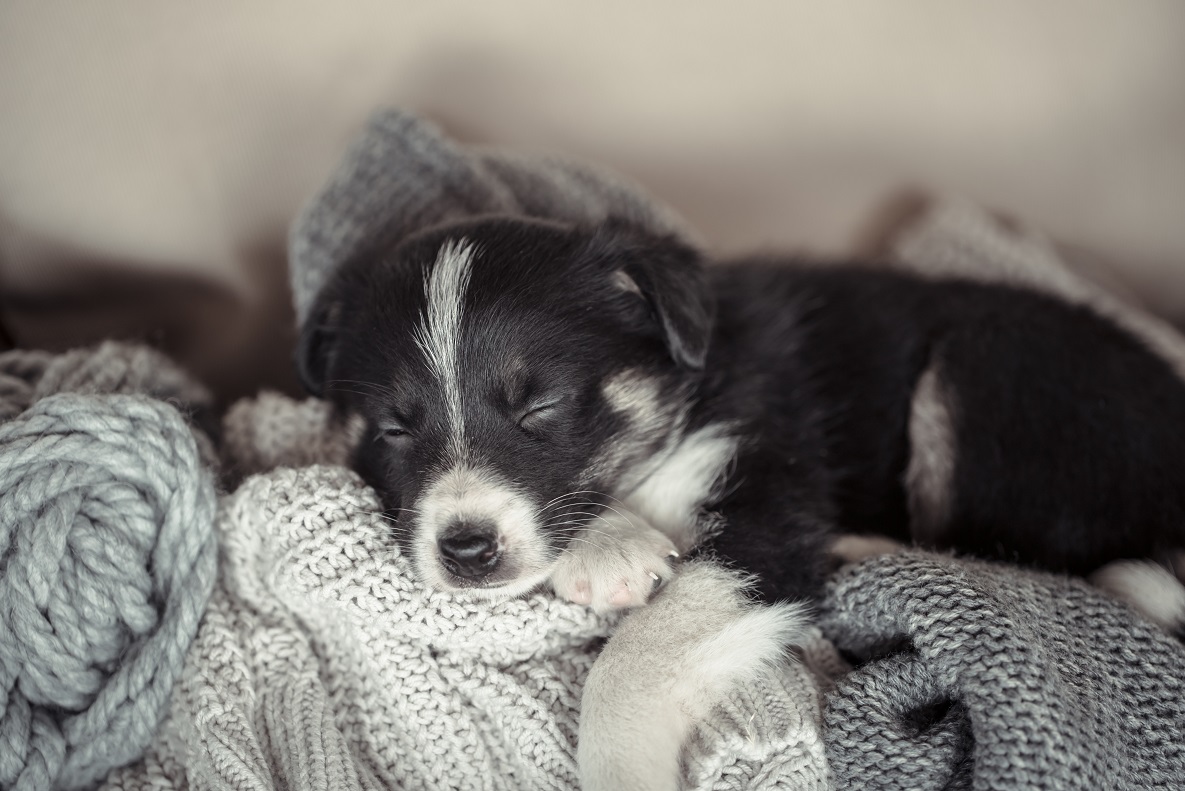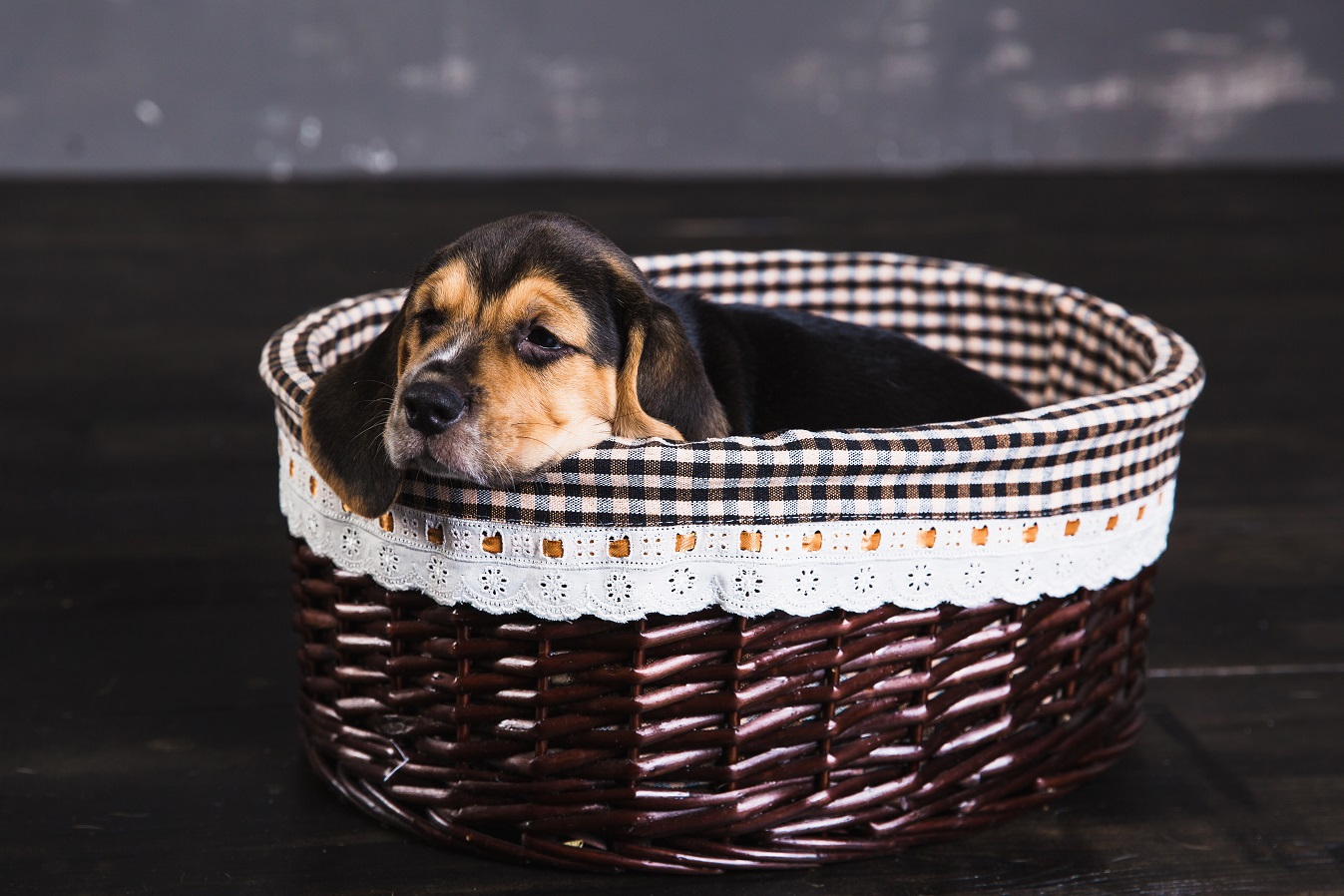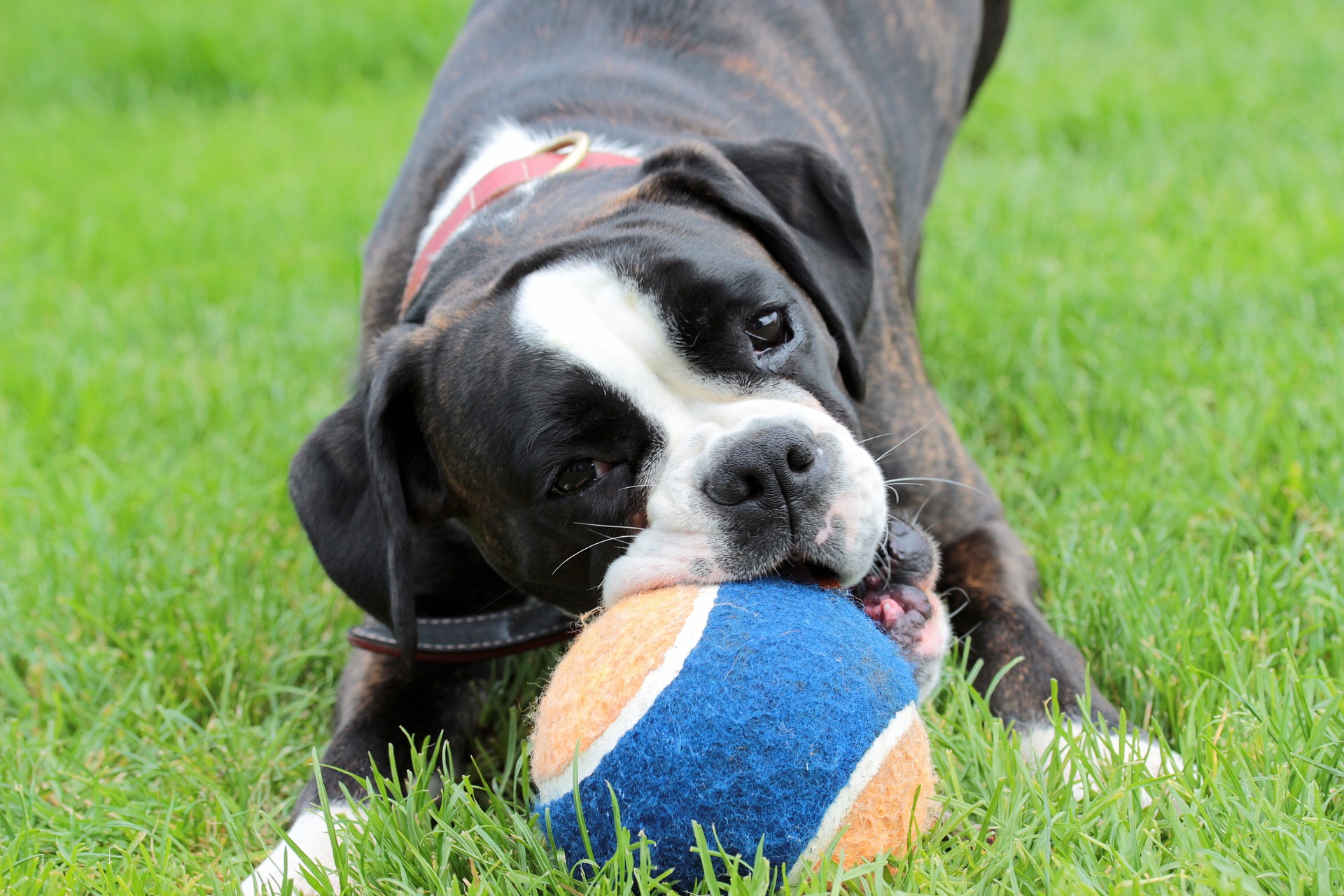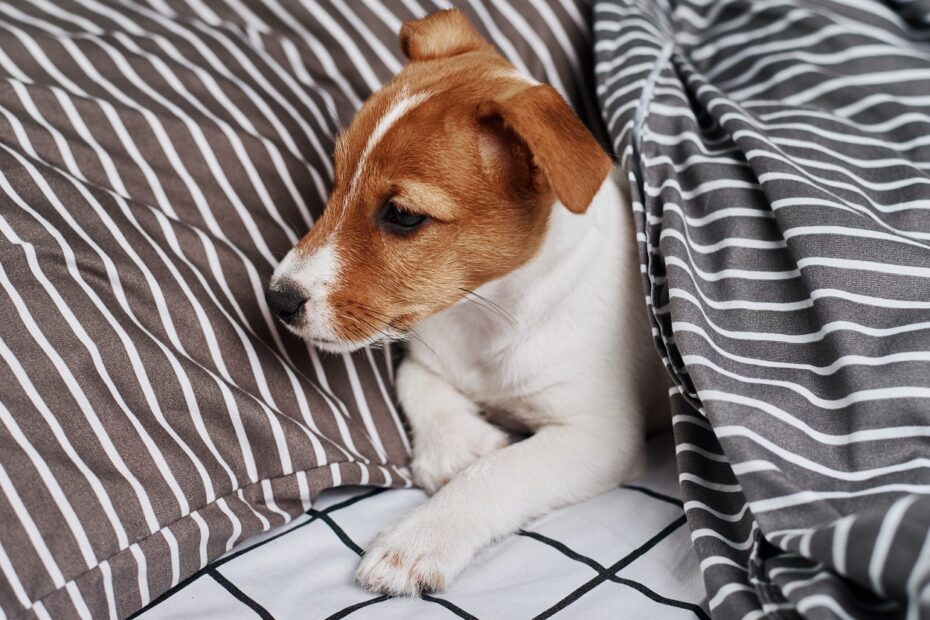If your puppy cries at night, you’re probably in desperate need of a good night’s sleep right about now.
Ultimately, all puppies cry. It’s part and parcel of the experience. But some puppies have turned crying into an art form.
And no doubt about it, it’s distressing.
Non-stop crying and whining can make those precious first few days and weeks with your new pup a miserable experience.
Are they in pain?
…Are they unhappy?
…Are you doing something wrong?
And most importantly, will either you, they, or anyone else in the family get a full night’s sleep again?
Believe it or not, these are all common enough questions for new puppy parents to ask. You might be tired, you might be frustrated, but trust me, you’re not alone.
Countless people have dealt with the exact same problem, and you know what? They survived.
They may have had a few more grey hairs by the end of it, but they got through it. As will you.
For most pups, crying is a stage that will pass naturally. But if you can make them feel safe, comfortable, and secure, you’ll get them there that much sooner.
The first step in the process? Learning why they do it.
WATCH VIDEO: 5 Step-By-Step Exercises To Quickly Stop Your Puppy Crying At Night…
(video will open in a new window)
Why Puppies Cry At Night
The first night you bring your pup home, you’re going to face one of two scenarios. Either they’ll be so tired by the events of the day they’ll fall asleep as soon as their head hits the pillow, or they’ll be too overwhelmed to do anything but cry.
Most people expect a bit of upset on the first night. What they don’t necessarily expect is for that upset to continue for quite so long as it sometimes does.
If you want to address the problem, you first need to understand what’s causing it. How do you do that? By learning to speak puppy.
Puppies cry for all kinds of reasons: to make them feel safe and comfortable (and way less noisy), you need to look at the bigger picture.
What, beyond the immediately obvious, is going on in your pup’s head to make them cry?
They Need the Bathroom
Puppies don’t gain full control of their bladders until they’re at least 4 – 6 months of age. Even after then, you can expect a few accidents before they’re fully house trained.
But puppies hate soiling their sleeping area. If they spend the night in a crate, they’ll prefer to wake you up then sleep in a dirty bed.
If your pup wakes up after a few hours and immediately starts crying, it’s very likely they need to use the bathroom.
They’re Hungry
Pups can only hold so much food at one time, but their energy needs are huge.
If it’s been several hours since their last meal, they might wake up with a rumbly tummy.
And if they do, make no mistake – they’re going to let you know about it.
They’re Overtired
Pups spend most of their day playing, running, jumping, and generally having a fine old time of it.
Which is exactly what they’re meant to do. The problem is, if all that play isn’t followed up by a nice long nap, they’re going to get overtired, out of sorts, and way too wired to even consider closing their eyes.
Put all of those things together, and you’re looking at no sleep for them, and no sleep for you either.
They Want Their Mommy
If you think about it, it’s not surprising pups cry.
There they were, perfectly happy with their mother and littermates, and then suddenly, some stranger came along and kidnapped them.
Now they’re surrounded by new sights and new smells, with no idea what the rules are and no brother or sister to ask for advice.
Sure, they’ve got you, but at the moment, you’re still a stranger in their eyes.
They’re lonely, they’re scared, and they want their family to come and rescue them. So they keep calling and calling in the hope they do.

What To Do If Your Puppy Cries At Night
Are you ready to put an end to the crying and finally get some sleep? Now you’ve got a clear idea of what’s making your puppy cry, you can start working on doing just that.
Make Sure They’re Comfortable
We like our beds to be comfortable, and so do pups.
Make sure they have plenty of blankets to snuggle up to and enough space to stretch out and get comfy.
It’s also worth checking the temperature – if it’s too hot or too cold, your pup’s less likely to settle down for some shut-eye.
Schedule Potty Breaks
Bladder control doesn’t kick in until a puppy reaches 4 – 6 months. If they wake up crying a couple of hours after hitting the hay, it’s very likely they need to use the toilet.
Buy yourself a few more hours of slumber by making sure they relieve themselves before going to bed.
Calm Them Down
If a pup goes to bed excited, you can bet it’s not going to take long before the crying starts.
After all, where’s the fun in sleeping when there are toys to play with, furniture to jump on, and ceilings to dance on?
The best strategy to deal with an over-excited pup that flips out at the tiniest thing?
Teach them the power of calm.
These 5 step-by-step calming exercises from the Online Dog Trainer will help your pup become more focused, calmer, and altogether more in control of their emotions. The exercises are simple to implement, quick to pick up, and best of all, hugely effective.
Try introducing them as part of your pup’s bedtime routine or whenever their emotions threaten to run away with them.
Limit Food and Water Before Bedtime
If your pup goes to bed with a full stomach and bladder, you can bet your life they’ll be crying to be let out before long.
Feed them a small meal a few hours before bedtime to waive off any midnight cravings, then limit any further snacks or sips in the hour before lights out.

Keep Close
If you can, let your puppy sleep in your bedroom. The closer they are to you, the less chance they’ll feel alone or abandoned.
Just knowing you’re there can be a huge comfort to a pup, especially in the first few days.
Don’t, however, be tempted to let them sleep in the same bed as you. There’s always the possibility that you may roll on top of them and hurt them.
Stick to setting up their bed or crate next to your bed – you’ll be close enough to be a comfort, but not so close as to be a danger!
Soothe Them with Music
The first few nights in a new home can be stressful for anyone, let alone a tiny puppy. Finding ways to soothe and calm their frazzled nerves can be a huge help.
Try playing them some soothing music before bedtime to calm them down and lower their stress levels.
You might also find it helpful to implement these 5 step-by-step calming exercises. Taking just a few minutes to run through the exercises with your pup can help focus and calm their mind regardless of all the distractions happening around them.
As with all exercises, the more often you practice, the better.
Try Crate Training
If the thought of shutting your little pup away in a crate fills you with horror, it’s understandable. But it may be worth setting aside your gut reaction and re-considering.
Crates can be an invaluable tool for house training and encouraging your pup to sleep through the night.
Better still, they provide a safe refuge away from the hustle and bustle of the house – perfect for when your pup’s feeling a little overwhelmed and in need of some alone time.
Once your pup gets used to their crate, they’ll soon relish the prospect of having somewhere safe, quiet, and all theirs to nap in.
Keep Hunger at Bay
Feeding your pup a large meal before bedtime is asking for trouble (hello, midnight dash to the yard!). But feeding them a small meal a couple of hours beforehand can help keep the midnight munchies at bay.
Remember that a pup’s energy needs can change rapidly over a very short time. In case you have any concerns about just how much or how often you should be feeding your growing pooch, consult your vet.
Increase their Activity
A pup has a huge amount of energy. It’s what makes them so much fun. It’s also what makes them more inclined to spend their nights crying than sleeping.
Remember, a tired dog is a happy dog – make sure they get lots of opportunities to blow off some steam during the day.
A dog that goes to bed exhausted will fall asleep far faster than one who’s still got energy to burn.

Give Them Something to Chew On
If a dog wakes up in the night a bit bored, it won’t take them long to realize that crying gets them company.
Recognizing when to ignore your dog’s cries and when you really shouldn’t is part and parcel of owning a pup.
If they cry a few hours after going to bed, take them out straight away to use the bathroom. If they continue to cry after you put them back to bed, check whether they’re genuinely upset or just bored and frustrated.
An upset dog will usually tremble, cry continually, and display other signs of distress such as drooling.
A bored dog, on the other hand, is likely to cry in fits, dig around, and stop crying the moment you distract them.
If they’re simply whining for attention, don’t give it to them. It may sound harsh, but if they learn that crying equals attention, they’ll never stop.
Instead, give them a few rubber toys to chew on in your absence. Not only is chewing relaxing, it’ll keep their mouth too occupied to cry.
Establish a Routine
It’s never too early to introduce a bit of routine into your dog’s life.
Following the same pattern each night will let your pup know when it’s time to start winding down and get ready for bed.
Give them a few last minutes of play, take them out to use the bathroom, then pop on some soothing music and start preparing for bed.
Make sure there’s nothing and no one around to serve as a distraction.
If you sense their excitement is still running high, take a few minutes to calm them down with these 5 step-by-step calming exercises.
Whatever your routine is, keep it consistent – if every night is different, your pup will find it difficult to know what’s expected of them.
Use Their Nose to Your Advantage
During the first few nights in their new home, your pup is likely to feel lost and more than a little bit bewildered.
As smells can be hugely comforting, ask the breeder if they have a toy or blanket with the scent of the pup’s mother on it. Place the item in their bed for them to snuggle up to.
As it’s important that they begin to think of you as their family too, give them something with your scent as well.
Final Thoughts
Everyone tells you that having kids is going to be tough. What no one ever mentions is that raising a pup can be just as tricky.
But hold tight. The first few days and weeks might be exhausting, but the more effort you put in now, the greater the rewards down the line.
Keep patient, keep consistent, and soon enough, your pup will be snoring through the night like a pro.
And until that happens, there’s always coffee.

